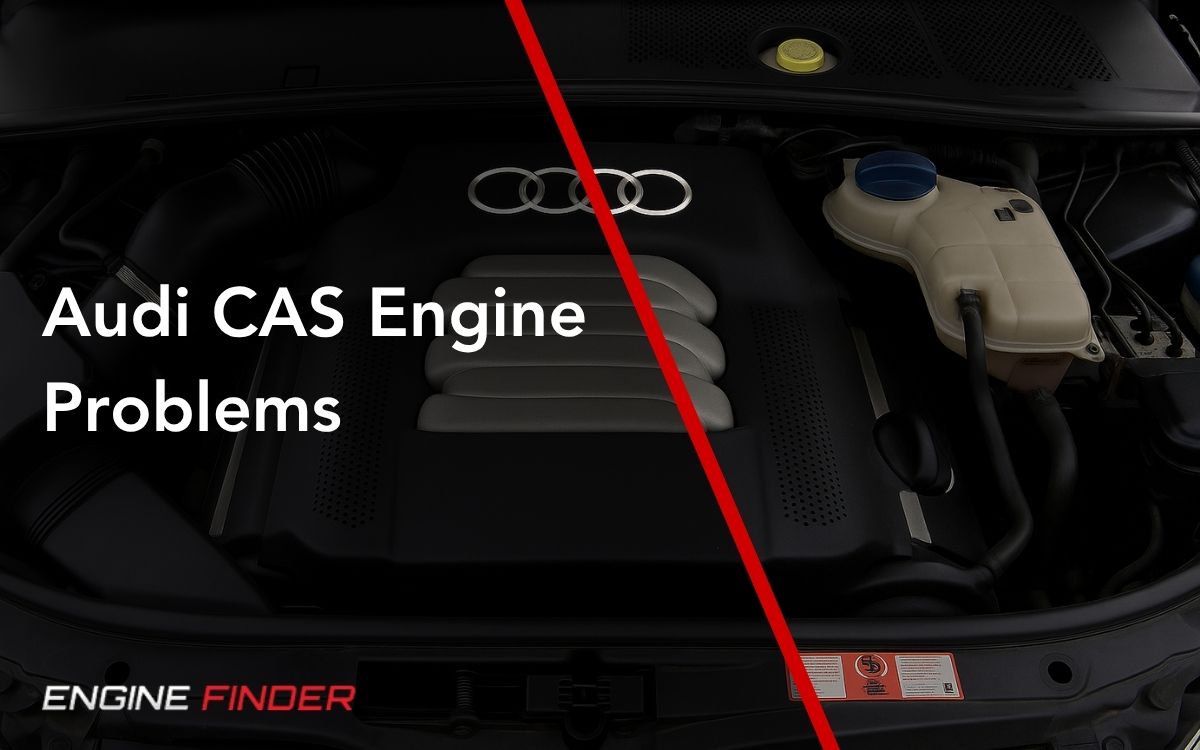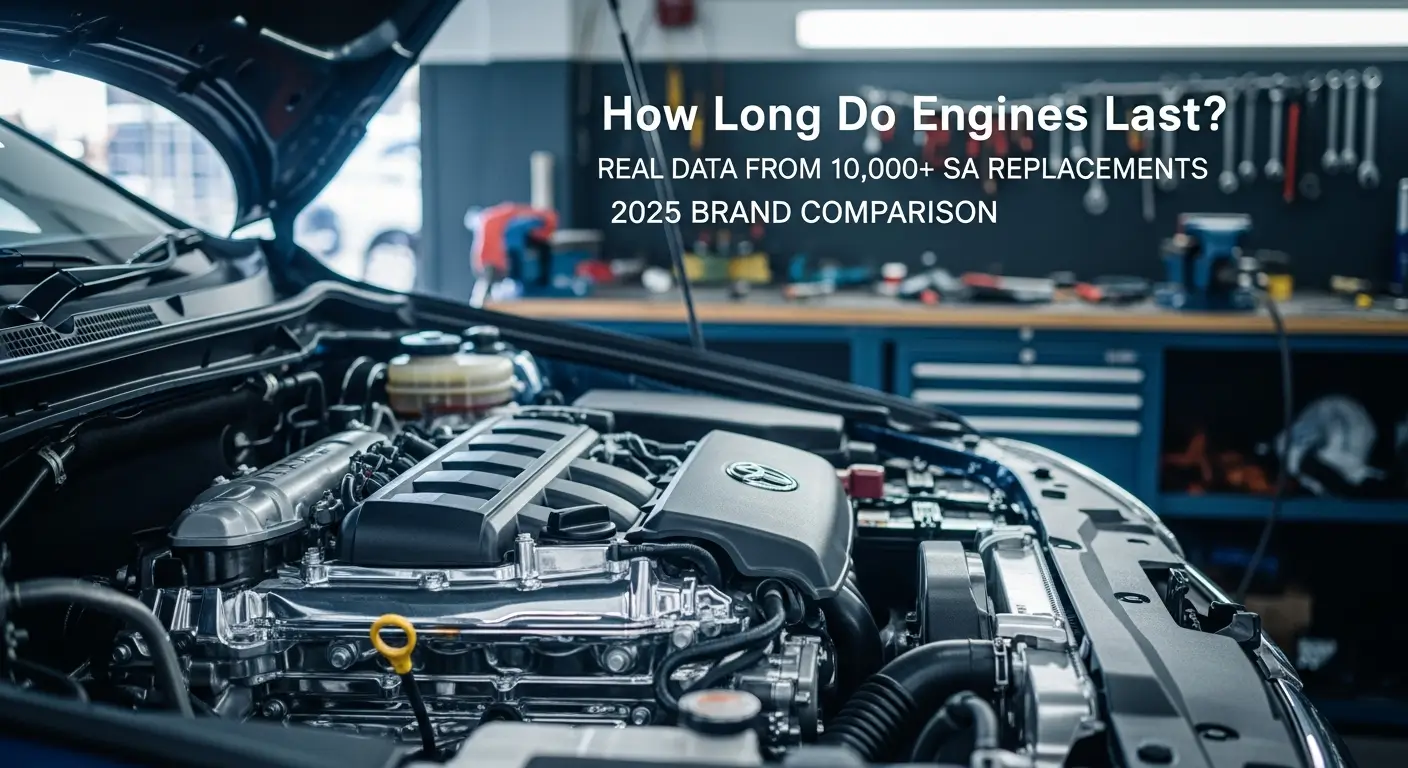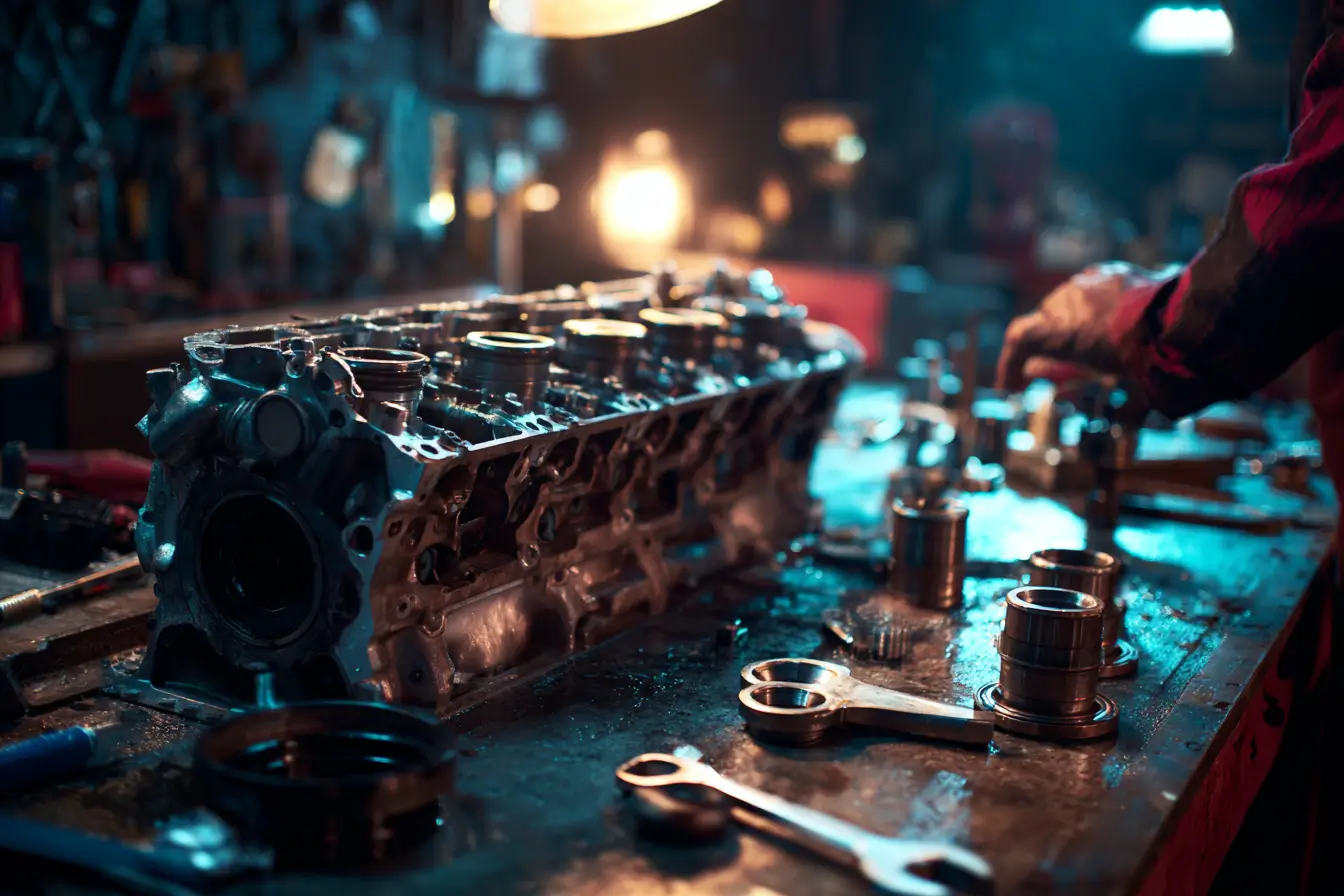
Common Audi CAS Engine Problems: Expert Solutions & Costs
Key Takeaways
| Problem | Main Symptoms | Possible Causes |
|---|---|---|
| Timing Chain Issues | Rattling noise, timing errors, poor performance | Chain stretch, tensioner wear, oil pressure loss |
| Intake Swirl Flap Failure | Reduced power, rough idle, error codes | Flap sticking, carbon buildup, actuator failure |
| High-Pressure Fuel Pump Problems | Hard starting, power loss, fuel pressure codes | Pump wear, contamination, drive system failure |
| EGR Valve Malfunction | Black smoke, limp mode, emissions failure | Carbon deposits, valve sticking, cooler blockage |
| Turbocharger Reliability Issues | Power loss, boost codes, oil leaks | Actuator failure, bearing wear, oil contamination |
The Audi CAS engine is a 3.0-liter V6 turbocharged diesel engine that powered the Audi Q7 and Volkswagen Touareg from May 2009 to June 2010. As part of the third-generation 3.0 TDI family, this sophisticated powerplant delivers impressive performance with 240 horsepower and advanced common rail injection technology. However, like many complex modern diesels, the CAS engine has developed specific common issues that owners should understand for proper maintenance and early problem detection.
Audi CAS Engine Specifications
| Specification | Details |
|---|---|
| Engine Code | CAS |
| Engine Family | 3.0 TDI V6 (3rd Generation) |
| Displacement | 2,967cc (3.0L) |
| Configuration | V6, 24-valve, DOHC |
| Power Output | 176 kW (240 hp) |
| Fuel System | Common Rail Direct Injection |
| Turbocharging | Variable Geometry Turbocharger |
| Application | Audi Q7 (4LB), VW Touareg |
| Production Years | May 2009 - June 2010 |
1. Timing Chain Issues
The timing chain system in CAS engines is prone to premature wear and tensioner failure, particularly when maintenance intervals are extended or low-quality oil is used.
Causes
- Timing chain tensioner hydraulic failure
- Chain stretch due to extended oil change intervals
- Low oil pressure affecting chain lubrication
- Sprocket wear from metal debris contamination
- Manufacturing tolerances in early production units
Symptoms
- Metallic rattling noise from engine front, especially on startup
- Engine timing correlation fault codes
- Reduced engine performance and rough idle
- Chain rattle that increases with engine temperature
- Oil pressure warning lights in severe cases
Solution
- Complete timing chain kit replacement: R45,000 - R65,000
- Chain tensioner replacement: R15,000 - R25,000
- Oil pump and pickup tube service: R12,000 - R18,000
- Engine oil flush and premium oil: R3,000 - R5,000
DIY Difficulty / Hours
- Timing chain replacement: Professional only / 14-20 hours
- Requires specialized VAG timing tools and engine support
Critical Warning
Timing chain failure can cause catastrophic valve and piston damage in interference engines. Address chain rattle immediately to prevent complete engine failure requiring full rebuild.
2. Intake Swirl Flap Failure
The intake manifold swirl flaps are designed to optimize airflow but frequently fail due to carbon buildup and actuator wear, affecting engine performance and emissions.
Causes
- Carbon accumulation causing flap binding
- Actuator motor electrical failure
- Mechanical linkage wear and breakage
- Poor quality diesel fuel contributing to deposits
- Manufacturing defects in early actuator units
Symptoms
- Significant reduction in engine power
- Rough idle and hesitation during acceleration
- Intake manifold flap error codes (P2015, P2017)
- Limp mode activation under load
- Unusual whistling sounds from intake
Solution
- Intake manifold replacement with updated design: R25,000 - R35,000
- Swirl flap actuator replacement: R8,000 - R15,000
- Intake manifold cleaning service: R4,500 - R7,000
- Actuator motor replacement: R6,000 - R10,000
DIY Difficulty / Hours
- Actuator replacement: High difficulty / 6-8 hours
- Manifold replacement: Professional recommended / 8-12 hours
Technical Note
Many specialists recommend upgrading to blank-off plates to eliminate swirl flap issues permanently, though this may affect emissions compliance in some regions.
3. High-Pressure Fuel Pump Problems
The common rail high-pressure fuel pump is critical for proper injection pressure but can fail due to contamination, wear, or drive system problems.
Causes
- Fuel contamination from poor-quality diesel
- High-pressure pump drive chain wear
- Internal pump component wear and scoring
- Water contamination in fuel system
- Inadequate fuel filtration
Symptoms
- Difficult starting, especially when cold
- Loss of power during acceleration
- Fuel rail pressure fault codes (P0087, P0088)
- Engine misfiring under load
- Metallic knocking from fuel pump area
Solution
- High-pressure fuel pump replacement: R35,000 - R50,000
- Fuel system cleaning and flush: R5,000 - R8,000
- Fuel rail pressure sensor replacement: R4,000 - R7,000
- Complete fuel filter service: R2,500 - R4,000
DIY Difficulty / Hours
- Fuel pump replacement: Professional only / 8-12 hours
- Requires specialized high-pressure system tools
Safety Alert
High-pressure fuel systems operate at extreme pressures (up to 2,000 bar). Never attempt repairs without proper training and equipment to prevent serious injury.
4. EGR Valve Malfunction
The Exhaust Gas Recirculation system experiences accelerated carbon buildup in the CAS engine, leading to valve sticking and cooling system contamination.
Causes
- Excessive carbon accumulation in EGR passages
- EGR valve sticking in open or closed position
- EGR cooler internal contamination and scaling
- Position sensor calibration drift
- Poor diesel fuel quality accelerating deposits
Symptoms
- Excessive black smoke during acceleration
- Engine entering limp mode unexpectedly
- EGR-related fault codes (P0401, P0403, P0404)
- Reduced fuel economy and sluggish performance
- Coolant contamination from EGR cooler failure
Solution
- EGR valve replacement: R12,000 - R18,000
- EGR cooler replacement: R18,000 - R28,000
- Complete EGR system cleaning: R6,000 - R10,000
- EGR position sensor replacement: R3,500 - R6,000
DIY Difficulty / Hours
- EGR valve cleaning: Medium difficulty / 3-5 hours
- EGR cooler replacement: Professional recommended / 6-10 hours
Maintenance Tip
Regular highway driving and quality diesel fuel with cleaning additives help prevent EGR carbon buildup. Consider professional cleaning every 80,000km.
5. Turbocharger Reliability Issues
While generally robust, the variable geometry turbocharger can develop problems with the actuator mechanism and internal components, particularly in high-mileage applications.
Causes
- Turbocharger actuator motor electrical failure
- Carbon buildup affecting variable geometry vanes
- Oil contamination from engine oil leaks
- Bearing wear from inadequate lubrication
- Boost pressure sensor malfunctions
Symptoms
- Significant power loss during acceleration
- Turbocharger underboost or overboost codes
- Whistling or grinding noises from turbo area
- Blue smoke indicating oil burning
- Oil leaks around turbocharger housing
Solution
- Turbocharger replacement (remanufactured): R35,000 - R50,000
- Actuator motor replacement: R15,000 - R22,000
- Turbocharger cleaning and service: R8,000 - R12,000
- Boost pressure sensor replacement: R3,500 - R6,000
DIY Difficulty / Hours
- Actuator replacement: High difficulty / 5-8 hours
- Turbocharger replacement: Professional only / 8-14 hours
Important Warning
Continuing to drive with turbocharger failure can cause engine oil starvation and contamination. Address turbo problems immediately to prevent secondary damage.
Preventative Maintenance Tips
Regular Service Schedule
| Service Type | Interval | Critical Components |
|---|---|---|
| Oil and Filter Change | Every 15,000km or 12 months | High-quality 5W-30 oil (VW 507.00 spec) |
| Fuel Filter Replacement | Every 60,000km | OEM quality filter essential |
| Air Filter Service | Every 40,000km | Clean intake system thoroughly |
| EGR System Cleaning | Every 80,000km | Professional cleaning service |
| Timing Chain Inspection | Every 120,000km | Listen for unusual noises |
Critical Maintenance Items
- Premium Oil: Use only VW 507.00 specification oil, never exceed service intervals
- Quality Fuel: Always use premium diesel from reputable suppliers
- Early Diagnosis: Address unusual noises, warning lights, or performance changes immediately
- Proper Warm-up: Allow engine to reach operating temperature before heavy loads
FAQ
How reliable is the CAS engine compared to other 3.0 TDI variants?
The CAS engine is generally reliable but represents a transitional period in 3.0 TDI development. With proper maintenance, it can achieve 400,000+ km, though timing chain and fuel system attention is crucial.
What’s the most expensive repair to expect on a CAS engine?
Complete timing chain replacement is typically the most expensive repair (R45,000-R65,000), followed by high-pressure fuel pump replacement and turbocharger rebuild.
Are there any known recalls for CAS engines?
Some CAS variants have been subject to technical service bulletins for timing chain tensioner updates and fuel pump improvements. Check with an Audi dealer for applicable campaigns.
How can I prevent timing chain problems?
Use high-quality oil, maintain strict service intervals (max 15,000km), monitor oil levels regularly, and address any unusual noises immediately.
Is the CAS engine affected by emissions regulations?
The CAS engine meets Euro 5 emissions standards but may face restrictions in some low-emission zones. Ensure all emission control systems are functioning properly.
Watch: 3.0 TDI Engine Analysis and Repair
Detailed timing chain replacement and root cause analysis by Just Grow Cars
Comprehensive overview of 3.0 TDI common faults and preventative maintenance
Conclusion
The Audi CAS engine represents sophisticated diesel technology that delivers excellent performance when properly maintained. While it has specific vulnerability points—particularly the timing chain system and fuel injection components—understanding these issues allows owners to maintain their vehicles proactively and address problems before they become catastrophic.
Success with the CAS engine requires strict adherence to maintenance schedules, use of premium consumables, and immediate attention to any unusual symptoms. For South African owners experiencing CAS engine problems, Engine Finder provides access to quality Audi engines for sale and specialist technical support throughout the country.
The key to CAS longevity lies in respecting its sophisticated engineering while being vigilant about its known weak points, particularly timing chain maintenance and fuel system care.
References and Further Reading
Official Technical Documentation
- Audi Self-Study Program SSP 350: The 3.0L V6 TDI Engine
- Audi Technical Service Bulletin MC-10072887-0699
Advanced Technical Resources
Community Resources
Related Articles
Explore more insights on similar topics

How Long Do Engines Last on Average? Complete Longevity Guide
Understand real-world engine lifespan ranges, warning signs, lifecycle stages, costs, and maintenance best practices for South African drivers.

How Does an Engine Overhaul Work? Complete Guide to Engine Rebuilds
Learn everything about engine overhauls: types, warning signs, process, costs, and when to rebuild vs replace your engine in South Africa.
.webp)
Timing Chain vs Timing Belt: Complete Guide to Cambelt Replacement & Lifespan
Learn everything about timing chains and timing belts (cambelts): differences, lifespans, replacement costs, and which is better for your engine in South Africa.
Important Disclaimer
This content is for informational purposes only and is based on research from automotive industry sources. Engine Finder is not a certified automotive repair facility. Always consult with qualified automotive professionals before performing any repairs or maintenance. Improper repairs can result in personal injury, property damage, or vehicle malfunction. We assume no responsibility for actions taken based on this information.
